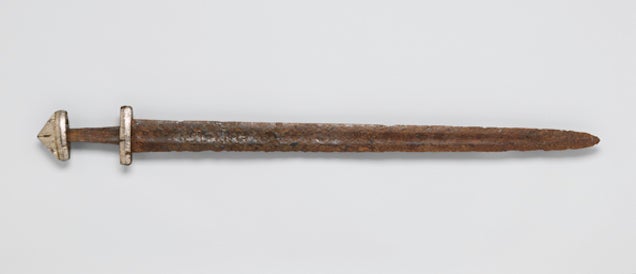
When we look at the history of new technologies, we tend to think of only our most recent past. But more than a thousand years ago, blacksmiths succeeded in making a set of ultra-strong swords — that are tricky to re-create even today.
After reading about the technology behind the legendary swords of Damascus, Kinja-user Formless-One reminded us of another set of famous, very old swords — swords that were also a technological marvel of the time:
Consider this: making Damascus is not the only lost art of ancient weapon smiths. The Vikings also had swords made of crucible steel, known as Ulfberts (because that was the name stamped onto all of them, in accordance with Nordic tradition). This was before the 10’th century. Crucible steel wouldn’t be seen again until basically the dawn of the industrial revolution. This is big, because crucible steel is springier and tougher all around than Damascus and anything else from the time— Ulfberts were, materially speaking, the best swords ever made up until that point. Were they as sharp as Damascus? Probably not, but there is a limit to how sharp a sword really needs to be once you realize that they aren’t knives. Swords have a biomechanical advantage over knives because of their length— you can accelerate the tip of the weapon so fast and effortlessly that if they hit unarmored or lightly armored flesh, you can count on it cutting whether it is made of bronze, crucible steel, or Damascus. Thus, the advantage of crucible steel and other stiff-yet-springy steels that came around in the Renaissance period gave them durability and strength that you really want in a weapon. Those weapons were made to compete in an arms vs armor race where stabbing was often how you attacked a man in plate, that didn’t really happen in the middle east where Damascus comes from. In context, the weapons that came out of Europe were perfect for European warfare. The weapons made in India and the middle east were perfect for Indian and middle eastern warfare. And the two styles of warfare rarely came into contact during that time, except to some degree in Eastern Europe where there was contact with the Ottoman Turks.
A recent NOVA documentary featured swordsmiths from today attempting to re-create the Ulberfht swords, using modern techniques — a feat they did manage, but not without plenty of trouble along the way.
Image: Ulfberht sword, 850–900, From the Met’s Collection Lent by Laird and Kathleen Landmann, 2006
via Gizmodo
How Did The Ancient Vikings Make This Super-Strong Sword?
Raising massive rounds these days is so commonplace that most of us tune out fundraising news altogether. The fundraising environment has changed so dramatically over the past four years, it’s almost incomprehensible to those of us who lived through it. Read More